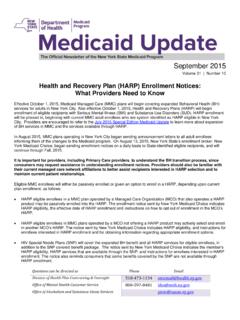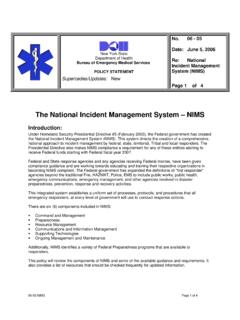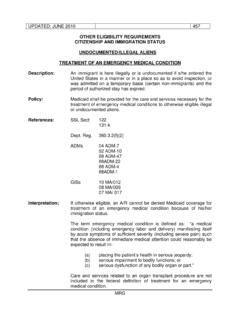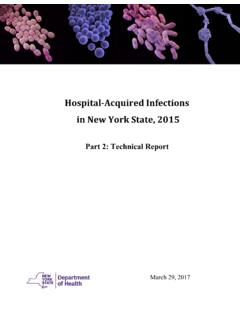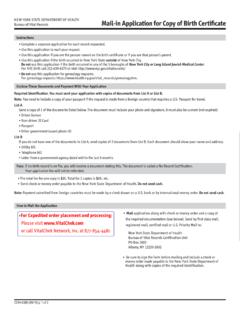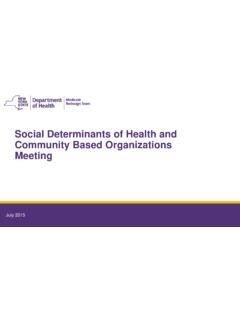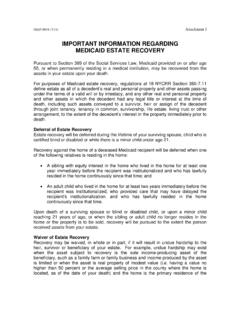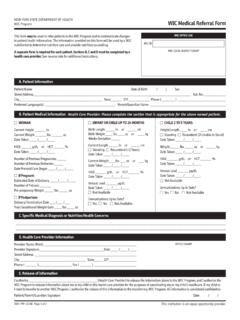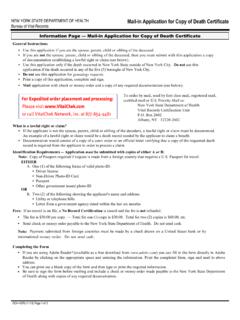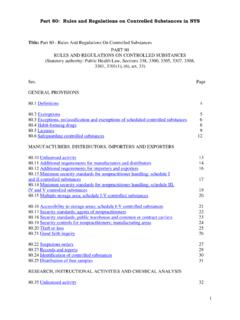Transcription of Role of the Attending Physician in the Nursing Home
1 1 ROLE OF THE Attending Physician IN THE Nursing HOME1 Executive Summary Nationwide, Nursing facility care is changing to include not only long-term care of frail residents but also complicated and resource-intensive post-hospital care. The population of people receiving care in Nursing facilities is more medically complex as patients are discharged sicker and quicker from the hospital to skilled Nursing facilities and the hospitals focus on decreasing readmission rates. However, the majority of patients are still long term stay patients who themselves have increased in medical complexity and acuity. Both of these imperatives have resulted in an increased need for highly trained and committed health care practitioners willing to provide care on-site to Nursing facility residents.
2 Physician involvement in Nursing facilities is essential to the delivery of quality long-term care. Attending physicians should lead the clinical decision-making for patients under their care. They can provide a high level of knowledge, skill, and experience needed in caring for a medically complex population in a climate of high public expectations and stringent regulatory requirements. The New York State Department of Health initiated and convened a workgroup of stakeholders in June of 2010 to address these issues with the goal of improving health outcomes and quality of life for Nursing home residents by strengthening medical direction and medical care. The charge to the workgroup was: Improve health outcomes and quality of life for Nursing home residents by strengthening medical direction and medical care through the provision of written guidance and model policies and procedures for: (1) Credentialing; (2) The role, responsibilities and accountabilities of medical directors; and (3) The role, responsibilities and accountabilities of Attending physicians, nurse practitioners and physicians assistants.
3 Various stakeholders were called upon to help with this process. They included representation form the following organizations: New York Association of Homes and Services for the Aged (NYAHSA), The New York State Health Facilities Association, Inc. (NYSHFA), Healthcare Association of New York State (HANYS), Continuing Care Leadership Coalition (CCLC), Medical Society of the State of New York (MSSNY), the American Geriatrics Society (AGS), the American Medical Directors Association (AMDA), the New York Medical Directors Association and SUNY Albany School of Public Health, as well as physicians and Nursing home administrators with rural (upstate) and urban (downstate) experience. After consideration of the multiple issues and factors involved in the way medical care was currently being provided in Nursing homes in New York State, consideration of the current research in the field, an exhaustive nationwide search of practices in other States, as well as holding it s own medical culture change workshops and affinity exercises, the workgroup defined the new desired actions, beliefs and culture of medical care in the Nursing home in order to develop these model best practice guidelines for medical directors, Attending physicians and Physician extenders.
4 The following is an outline of the guideline for the Attending Physician . 2 ROLE OF THE Attending Physician IN THE Nursing HOME A. Introduction B. General Facility Responsibilities C. Physician Training, Qualifications and Medical Director Oversight D. Physician Supervision of Medical Care a. Regulatory Visits i. Physician Responsibilities ii. Facility Responsibilities b. Acute Illness Visits i. Physician Responsibilities 1. Presence in the Facility ii. Facility Responsibilities E. Initial Patient Care/Care Transitions a. Physician Responsibilities b. Facility Responsibilities F. Discharges and Transfers a. Physician Responsibilities b. Facility Responsibilities G. Physician Notification/Ongoing Coverage a. Physician Responsibilities i.
5 Coverage ii. Availability by Telephone b. Facility Responsibilities H. Appropriate Care for Residents I. Appropriate, Timely Medical Orders and Documentation J. Relationship With Residents and Families K. Professional Conduct L. General M. Non- Physician Providers ROLE OF THE Attending Physician IN THE Nursing HOME A. Introduction 3 Nationwide, Nursing facility care is changing to include not only long-term care of frail residents but also complicated and resource-intensive post-hospital care. The population of people receiving care in Nursing facilities is more medically complex as patients are discharged sicker and quicker from the hospital to skilled Nursing facilities and the hospitals focus on decreasing readmission rates.
6 However, the majority of patients are still long-term stay patients who themselves have increased in medical complexity and acuity. Both of these imperatives have resulted in an increased need for highly trained and committed health care practitioners willing to provide care on-site to Nursing facility residents. Physician involvement in Nursing facilities is essential to the delivery of quality long-term care. Attending physicians should lead the clinical decision-making for patients under their care. They can provide a high level of knowledge, skill, and experience needed in caring for a medically complex population in a climate of high public expectations and stringent regulatory requirements. The guidelines also endorse efforts to improve the training of all health care providers, including non- Physician providers, in the principles and practice of geriatric medicine and other medical disciplines dealing with chronic care conditions in order to have all providers obtain a sufficient level of knowledge and skills so that care will be provided concomitant with patient s complex needs.
7 These guidelines support and encourage interdisciplinary, team-based care and are committed to promoting and celebrating the many unique and valuable contributions and perspectives of all disciplines to enhance the quality of care. In order to foster this interdisciplinary collaboration, in addition to delineating the role of the Attending Physician in the Nursing home setting, these guidelines outline various responsibilities that the facility should entertain as well. The specifics are interspersed within the guideline. However, there are some overriding principles that are delineated here. B. General Facility Responsibilities The administrator and staff will: collaborate with the medical director to create an environment conducive to the delivery of appropriate medical practice and health-related services; provide reference and guidance to regulatory guidelines for the Attending physicians as needed; and provide Attending physicians with supports needed to fulfill responsibilities, including ensuring that the personnel, resources, supplies, and ancillary services are available to allow the staff and practitioners to care for residents appropriately.
8 With regard to Physician supervision; the facility shall ensure that: the medical care of each resident is supervised by a Physician who assumes the principal obligation and responsibility to manage the resident's medical condition; and another Physician supervises the medical care of residents when the resident's Attending Physician is unavailable. 4 C. Physician Training, Qualifications and Medical Director Oversight Physicians and others providing medical care to residents of Nursing facilities and other long-term care facilities must possess a current and valid New York State license as a medical professional. This will be verified by the Nursing facility as part of the process of granting privileges to the medical professionals.
9 Physicians and others providing medical care to residents of Nursing facilities and other long-term care facilities must possess a unique set of knowledge and skills. This includes: understanding the principles and practice of geriatric medicine, and other pertinent medical disciplines dealing with chronic care conditions; understanding drug prescribing guidelines for older adults and other complex long term care patients; familiarity with pertinent regulations governing long-term care facilities; understanding systems of care delivery; the ability to work effectively as part of an interdisciplinary team; and flexibility to take on evolving competency-based Physician education. The medical director helps coordinate and evaluate the medical care within the facility by reviewing and evaluating aspects of Physician care and practitioner services, and helping the facility identify, evaluate, and address health care issues related to the quality of care and quality of life of residents.
10 A medical director should establish a framework for Physician participation, and physicians should believe that they are accountable for their actions and their care. D. Physician Supervision of Medical Care The facility shall ensure that the medical care of each resident is supervised by a Physician who assumes the principal obligation and responsibility to manage the resident's medical condition and who agrees to visit the resident as often as necessary to address resident medical care needs. Each resident shall remain under the care of a Physician and shall be provided care that meets prevailing standards of medical care and services. Another Physician supervises the medical care of residents when the resident's Attending Physician is unavailable (see Coverage below).
